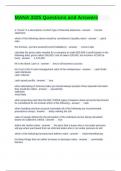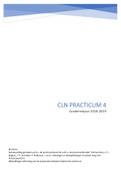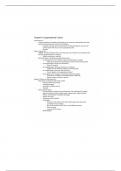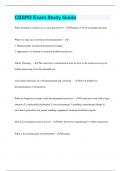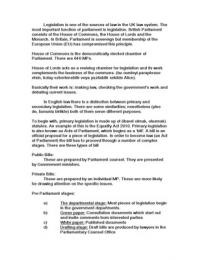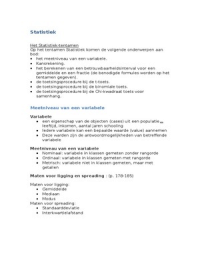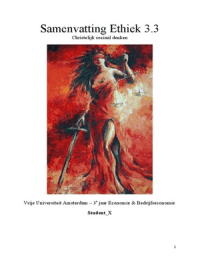TERM 4 NOTES
• Cost-Volume Profit Analysis
• Optimisation
• Activity Based Costing
• Mergers & Acquisitions
,These notes are summaries of lecture slides with my own
additions.
I do not take credit for any of the examples.
All of the questions and examples are the property of
Stellenbosch University.
Please do not replicate or share these notes.
,OPTIMISATION
LEXI SHTEIN
1
, OPTIMISATION
Drury - Chapter 9 & 26
Stellenbosch University Class notes:
Optimisation and linear programming
1. When product-mix decisions are made when capacity constraints apply, an optimal production plan must be determined in order
to maximise company profits.
2. The constraining or limiting factors (i.e. scarce resources) must be identified and taken into account when determining the optimal
production plan, together with the expected demand of each product and any minimum quantities that must be produced.
3. Where there is only one scarce resource used in the production of various products, the products must be ranked by the
contribution per limiting factor. The capacity of the scarce resource should be allocated according to this ranking.
4. Where there is more than one scarce resource, linear programming can be used to determine the optimal production plan.
5. The graphical method can be used to determine the optimal production plan where there are only two products that use the same
multiple scarce resources. The simplex method can be used when there are more than two products that use the same multiple
scarce resources (complete application of both these methods do not form part of the Management Accounting 378 syllabus).
6. When the graphical method is used, the objective function must be determined (i.e. to maximise contribution or minimise costs).
A graph must be prepared; each of the two products must be represented on a separate axis. The scarce resources and any other
limiting factors that limit production must be presented on the graph to determine the feasible region. The optimum production
levels are determined where the contribution line (or objective function line) reaches the last point in the feasible region (i.e.
optimal point). The optimum production plan can be read from the graph at that point, or can be more accurately determined, by
solving for simultaneous equations.
7. Once the optimum production levels are determined, management must attempt to obtain additional scarce resources that limit
production. Additional scarce resources will not necessarily be available at the same cost at which it was originally obtained.
Management must therefore only obtain additional scarce resources if the additional cost, over and above the current cost, is not
more than the shadow price of that scarce resource. A shadow price represents by how much the contribution will increase for
every additional unit of a scarce resource that can be obtained.
8. A shadow price also represents by how much contribution will decrease from the loss of one unit of a scarce resource.
Capacity cannot be extended in short-term à optimise available capacity
Product Changes:
vs
Variable manufacturing cost R80 R95
Sales price R100 R150
Contribution per unit R20 R55
Which product will you manufacture? NO YES
BUT assume labour hours per product: 1.5hours 4.5hours
Available labour hours = 320 hours
Contribution per hours: R13.33 R12.22
Which product will you manufacture? YES NO
• Short-term capacity constraints
• Short term decision making:
• How do I maximize profit?
à Optimal production plan (product mix)?
à Buy more of the scarce resource at higher price?
2


